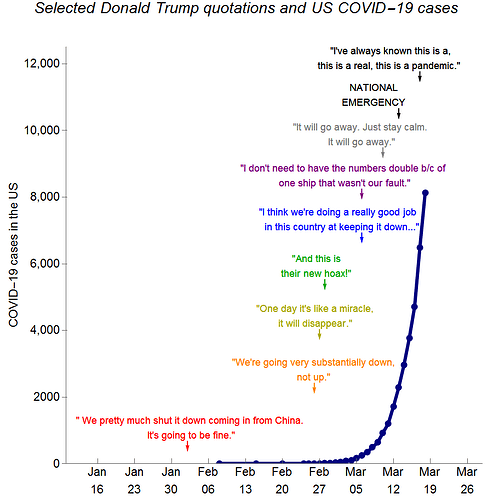Got me LOL there.
Not in the eyes of research and risk-adjusted returns (although distant history  ) .
) .
are you not worried for the consequences to the climate (and thus the economy) of continuing reliance on fossile fuels?
Correction to my post above it is a logistic function!!!
Wished I could bet on the reported numbers. Now it will get interesting. If the measures work, we should see the curve flattening next week, if not we will have a problem and they might call out the Ausgangssperre
I’m about to receive a lump sum of 26k CHF in the next few weeks. Additionally I’m able to save 4k/month (minus 200 CHF this month because I just got flashed on the autobahn  ).
).
I don’t want to lump sum this money. I might invest bi-weekly or monthly.
In how many months would you split the sum? I was thinking of around 3 months? Any opinions?
Make a progressive plan
Ben Felix, Market Crashes:
Worrying about climate change is nice intellectual exercise to be done sitting in the well manicured gardens of rich western societies. The highest energy consumption per capita is either rich western countries (+Japan/Korea/Australia) or those having oil wells in their backyards. Much of the ‘future’ energy demand is coming from Asia, and Africa, etc for whom the cheapest source of energy is and will remains fossil fuels. These poorer ‘emerging or emerged’ countries don’t have billions of dollars invest in renewable energies and nobody (aka ‘richer’ countries) are going to give assistance (either tech or financial) to the poorer countries to go down the same path as richer ones!
And if we are talking honestly, then the rich-industrialized high energy consuming countries paying lip service to climate-change is the biggest exercise of moral & intellectual dishonesty!
Asia and Africa will eventually clean their city air by moving to electric-rikshaws, but that electricity is still coming from coal, oil, and natural gas.
Sorry for going off-topic again.
Finally, have been waiting for this video from Ben!
This is a very good write-up (and I fully agree with it): https://www.guggenheiminvestments.com/perspectives/global-cio-outlook/value-is-a-poor-timing-tool
Don’t worry, I heard the mods don’t check this thread.
Regarding cutting down greenhouse gasses, I have a question for you all. Poland has double the emissions of Germany per unit of GDP. But Germany has double the emissions of Poland per capita. So which criterium is it fair to use if you set quotas?
maybe more complicated! energy consumption: direct and indirect!
If most of the products we use are manufactured in a small set if countries in asia / south-east-asia, then the energy spent and carbon emission for making those products should be counted in producer’s column or consumer’s column?
I believe it is the consumer i.e. us.
Your reasoning starts with this assumption, which I, in line with the climate science community, find very wrong. Climate change should worry us ALL, as a species, and if we don’t want a planet much less hospitable to humans than the one we are used to, we need to simply cut emissions of greenhouse gases big time, wherever they might come from. People are still in denial mode, much as we have recently seen with the virus emergency (it’s just a flu, just wash your hands, I still want to go out and hang out with friends etc…): people will start panic only when the threat will be in front of their eyes and the changes needed formidable.
Of course! Instead you always hear people complaining that China and India should cut their emissions, not considering that a huge amount of those emissions are caused by the crap we buy.
Another question: what about the huge ships carrying all this crap around the globe, are those counted at all?
And to kind of shift this side topic back on the right track: meat, which is produced on a mass scale, is a breeding ground for the next superbacteria or supervirus. Animals are packed together and fed antibiotics. Experts say that sooner or later it will produce bacteria which are immune to all antibiotics, even the last resort ones. China is a big culprit here. And there isn’t much we can do, is there? Even if their meat is only meant for local market, the microbes don’t respect country borders.
Well, we can eat less of it ![]() we can also fight to strengthen rules for animal wellbeing in the farms
we can also fight to strengthen rules for animal wellbeing in the farms
I don’t think we eat Chinese meat? It’s mostly for internal consumption. So you can’t persuade them with your wallet. And regarding international pressure: we don’t do much regarding their approach to human rights, so I wouldn’t hope that we could influence how they treat animals.
Because we like cheap stuff, and like it even more when somebody else pollutes their air/water/land to give us newest gadgets/toys/essentials which we enjoy with our clean land/air/water. And we like to own stocks of companies that make big profits this way.
You are probably right. But we do eat too much meat anyway, which is btw produced with antibiotics not only in China, but in many other places, like the US or Brazil (I often see meat coming from Brazil at the Migros restaurant). If we cannot directly influence China’s choices, we can also just give the good example.
This is unfortunately true. But with such pessimistic approach, why bother doing anything at all?
Though now we should be educated enough to realise that pollution in China or India will directly affect us all, not in 200 years, but in the next decades, especially greenhouse gases emission.
